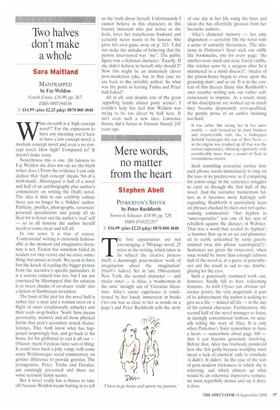Two halves don't make a whole
Sara Maitland
MANTRAPPED by Fay Weldon
Fourth Estate, 416.99, pp. 267, ISBN 0007194536
£14.99 (plus £2.25 p&p) 0870 800 4848 What on earth is a 'high concept novel'? For the expression to have any meaning you'd have to have a low concept novel, a medium concept novel and even a no concept novel. How high? Compared to? It doesn't make sense.
Nonetheless this is one. (In fairness to Fay Weldon she does not say so; the blurb writer does.) From the evidence I can only deduce that 'high concept' means tit of a mish-mash'. Man trapped is half of a novel and half of an autobiography plus author's commentary on writing the (half) novel. The idea is that in our celebrity culture there can no longer be a 'hidden' author. Publicity, profiles, photographs, reviewers' personal speculations and gossip all do their bit to ferret out the author's 'real' self — so in all honesty the author herself needs to come clean and tell all.
In one sense it is true of course. 'Confessional' writing is extremely fashionable at the moment and imaginative literature is not. Fiction has somehow failed its readers (or vice versa) and we crave something that passes as truth. We seem to have lost the knack of reading the bigger picture from the narrative's specific particulars. It is a serious cultural loss too, but I am not convinced by Man trapped that the solution is to insert chunks of soi-disant 'truth' into a fiction of flamboyant invention.
The basis of the plot for the novel half is rather fun: a man and a woman cross on a flight of stairs (traditionally unlucky) and their souls swap bodies. 'Souls' here means personality, memory and all those physical habits that aren't secondary sexual characteristics. They both know what has happened surprisingly fast, and go back to his house for his girlfriend to sort it all out — Orlando meets Feydeau farce sort of thing. It could have been a jolly romp, with some acute Weldonesque social commentary on gender difference to provide gravitas. The protagonists, Peter. Trisha and Doralee, are cunningly presented and there are some seriously funny scenes, But it never really has a chance to take off because Weldon keeps butting in to tell us the truth about herself. Unfortunately I cannot believe in this character, in this bouncy innocent who just writes as she feels, loves her treacherous husband and certainly never wants to be famous. She gives her own game away on p. 213: 'I did not make the mistake of believing that the person interviewed was "me". The public figure was a fictional character.' Exactly. If she didn't believe in herself, why should I? Now this might be an immensely clever post-modernist joke, but in that case we are back to the invisible author. So what was the point in leaving Trisha and Peter half-baked?
All in all, and despite one of the great 'appalling family dinner party scenes', I couldn't help but feel that Weldon was trying to be too clever by half here. It isn't even such a new idea: Lawrence Sterne did it better in Tristram Shandy 245 years ago.


















































































 Previous page
Previous page